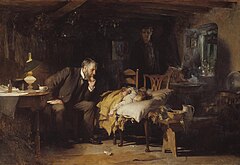Etymology[edit]
Medicine (UK: /ˈmɛdsɪn/ (![]() listen), US: /ˈmɛdɪsɪn/ (
listen), US: /ˈmɛdɪsɪn/ (![]() listen)) is the science and practice of the diagnosis, prognosis, treatment, and prevention of disease.[4][5] The word "medicine" is derived from Latin medicus, meaning "a physician".[6][7]
listen)) is the science and practice of the diagnosis, prognosis, treatment, and prevention of disease.[4][5] The word "medicine" is derived from Latin medicus, meaning "a physician".[6][7]
Clinical practice[edit]
Medical availability and clinical practice varies across the world due to regional differences in culture and technology. Modern scientific medicine is highly developed in the Western world, while in developing countries such as parts of Africa or Asia, the population may rely more heavily on traditional medicine with limited evidence and efficacy and no required formal training for practitioners.[8]
In the developed world, evidence-based medicine is not universally used in clinical practice; for example, a 2007 survey of literature reviews found that about 49% of the interventions lacked sufficient evidence to support either benefit or harm.[9]
In modern clinical practice, physicians and physician assistants personally assess patients in order to diagnose, prognose, treat, and prevent disease using clinical judgment. The doctor-patient relationship typically begins an interaction with an examination of the patient's medical history and medical record, followed by a medical interview[10] and a physical examination. Basic diagnostic medical devices (e.g. stethoscope, tongue depressor) are typically used. After examination for signs and interviewing for symptoms, the doctor may order medical tests (e.g. blood tests), take a biopsy, or prescribe pharmaceutical drugs or other therapies. Differential diagnosis methods help to rule out conditions based on the information provided. During the encounter, properly informing the patient of all relevant facts is an important part of the relationship and the development of trust. The medical encounter is then documented in the medical record, which is a legal document in many jurisdictions.[11] Follow–ups may be shorter but follow the same general procedure, and specialists follow a similar process. The diagnosis and treatment may take only a few minutes or a few weeks depending upon the complexity of the issue.
You received this message because you are subscribed to the Google Groups "1TopReadys1" group.
To unsubscribe from this group and stop receiving emails from it, send an email to 1topreadys1+unsubscribe@googlegroups.com.
To view this discussion on the web visit https://groups.google.com/d/msgid/1topreadys1/CAEXU47XhZ3FY2q8w2R4GADDvEUgjc8ZNqVojzec%3DsOj2TRjPhQ%40mail.gmail.com.


No comments:
Post a Comment